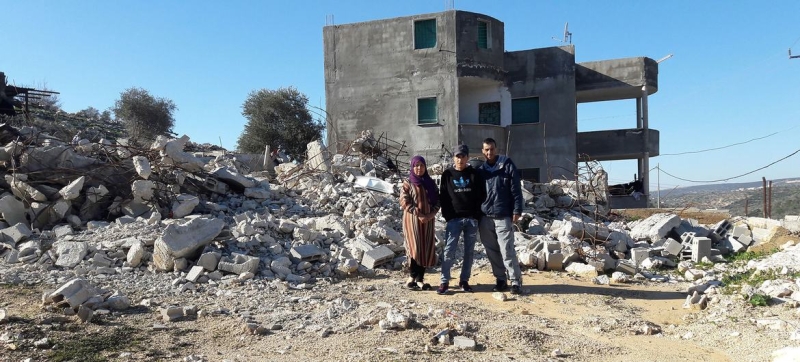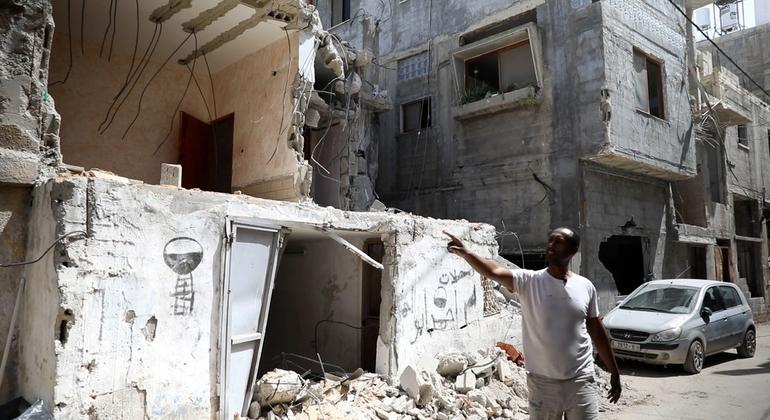
Palestinian refugees stand in front of their demolished West Bank home (archive). UN Human Rights Office Warns of Escalation in West Bank Peace and Security
Tensions are rising in the occupied West Bank amid Israeli military raids, airstrikes and settler attacks on Palestinians. The UN Human Rights Office (OHCHR) has warned that Israeli actions risk further escalating an “already volatile situation.”
“Today, Israeli operations in Jenin, Tubas and Tulkarm and the killing of at least nine Palestinians, two of whom were reportedly children, bring the death toll in the West Bank since 7 October to 637,” OHCHR spokesperson Ravina Shamdasani said on Wednesday.
On Monday evening, airstrikes on the Nur Shams refugee camp killed five people – three men and two boys, aged 13 and 15. “The three victims, including two boys, were killed as they walked past the house that was targeted in the attack, in a small, cramped alleyway in the camp,” the OHCHR said, citing multiple sources.
The UN office warned that the situation in the occupied West Bank could deteriorate sharply if Israeli security forces continue to “systematically use unlawful lethal force and ignore settler violence.”
The OHCHR stressed that the use of airstrikes, military weapons and tactics by security forces violates international law and has led to extrajudicial executions and other unlawful killings, as well as the destruction of Palestinian homes and infrastructure.
Settler Violence
Late on Monday, dozens of armed Israeli settlers attacked the village of Wadi Rahal in Bethlehem, leaving a 37-year-old Palestinian man “shot in the back” by allegedly armed settlers or army reservists. The settlers also reportedly wounded three other people and blocked Palestinian ambulances from reaching them.
The OHCHR cited sources as saying that Israeli security forces “stood by, watching until the man was killed, and only later dispersed the settlers without arresting any of them.” According to Israeli media, reservists opened fire, wounding several Palestinians.

The killing is not an isolated incident, but a direct consequence of Israel’s policy of settling the occupied West Bank in violation of international law, with the participation of security forces and with impunity, OHCHR stressed.
The UN Human Rights Office documents regular attacks by settlers on Palestinians, including arson and damage to property and crops, theft of sheep, blocking access to land, water and pastures, and forcing them to leave their homes.
Despite the announcement of investigations into several cases of violence and the occasional arrest of alleged perpetrators, no settlers have been charged in such cases since 7 October, OHCHR noted.
East Jerusalem
The OHCHR also said that in East Jerusalem, Israeli authorities continue to apply discriminatory laws and demolish Palestinian homes in violation of international law.
Read also:
UN: Israel must stop eviction of over 80 Palestinian families in East Jerusalem
Thousands of Palestinians are at risk of forced eviction in the Silwan area, the UN Office said. Six Palestinian homes have been demolished there since October 7, the OHCHR said. Israeli authorities have threatened to demolish the area, home to 1,550 Palestinians, to make way for the Green Zone.
“Gaza Disaster”
Meanwhile, a surge in evacuation orders in Gaza has left just 11 percent of the Strip outside of the orders. The enclave’s residents have been left with only “minimal” shelter, according to Louise Wateredge, a spokeswoman for the UN Refugee Agency (UNRWA). “Tanks have appeared in areas that were previously designated as safe zones, further evidence that there are no safe places left in the Gaza Strip,” she said.
“This is a disaster,” said Wateredge, who is in Gaza. “Hundreds of thousands of people are forced to move every day… we see families, mothers and children with belongings. Most people are moving on foot. There is very limited access to any kind of transport for this kind of movement now, and people just don’t know where to go,” she added.
